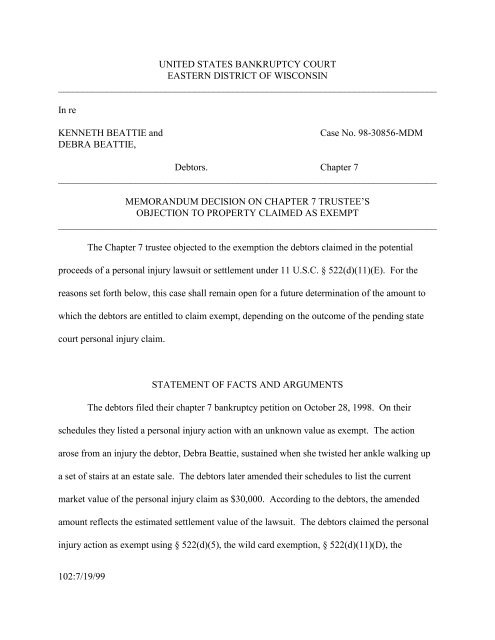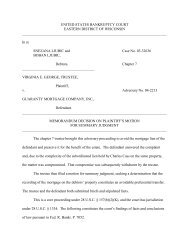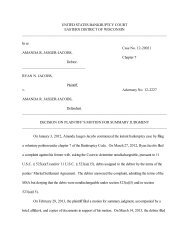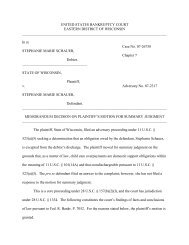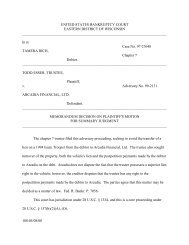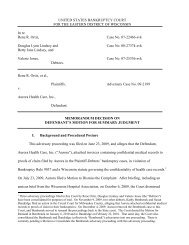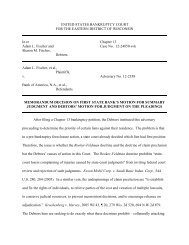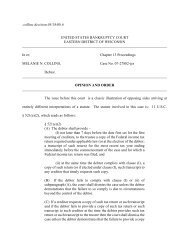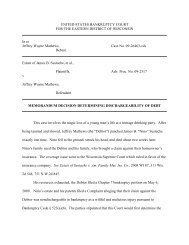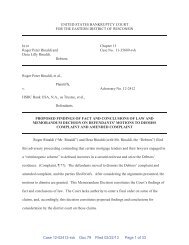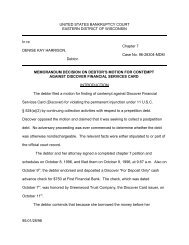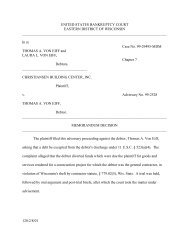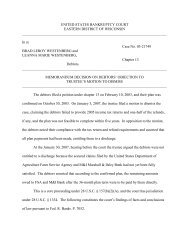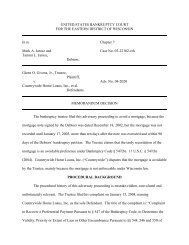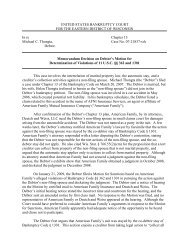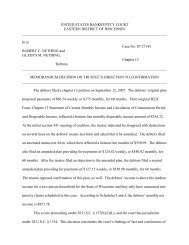In re Kenneth & Debra Beattie, Case No. 98-30856 - Eastern District ...
In re Kenneth & Debra Beattie, Case No. 98-30856 - Eastern District ...
In re Kenneth & Debra Beattie, Case No. 98-30856 - Eastern District ...
Create successful ePaper yourself
Turn your PDF publications into a flip-book with our unique Google optimized e-Paper software.
UNITED STATES BANKRUPTCY COURT<br />
EASTERN DISTRICT OF WISCONSIN<br />
______________________________________________________________________________<br />
<strong>In</strong> <strong>re</strong><br />
KENNETH BEATTIE and<br />
DEBRA BEATTIE,<br />
<strong>Case</strong> <strong>No</strong>. <strong>98</strong>-<strong>30856</strong>-MDM<br />
Debtors. Chapter 7<br />
______________________________________________________________________________<br />
MEMORANDUM DECISION ON CHAPTER 7 TRUSTEE’S<br />
OBJECTION TO PROPERTY CLAIMED AS EXEMPT<br />
______________________________________________________________________________<br />
The Chapter 7 trustee objected to the exemption the debtors claimed in the potential<br />
proceeds of a personal injury lawsuit or settlement under 11 U.S.C. § 522(d)(11)(E). For the<br />
<strong>re</strong>asons set forth below, this case shall <strong>re</strong>main open for a futu<strong>re</strong> determination of the amount to<br />
which the debtors a<strong>re</strong> entitled to claim exempt, depending on the outcome of the pending state<br />
court personal injury claim.<br />
STATEMENT OF FACTS AND ARGUMENTS<br />
The debtors filed their chapter 7 bankruptcy petition on October 28, 19<strong>98</strong>. On their<br />
schedules they listed a personal injury action with an unknown value as exempt. The action<br />
arose from an injury the debtor, <strong>Debra</strong> <strong>Beattie</strong>, sustained when she twisted her ankle walking up<br />
a set of stairs at an estate sale. The debtors later amended their schedules to list the cur<strong>re</strong>nt<br />
market value of the personal injury claim as $30,000. According to the debtors, the amended<br />
amount <strong>re</strong>flects the estimated settlement value of the lawsuit. The debtors claimed the personal<br />
injury action as exempt using § 522(d)(5), the wild card exemption, § 522(d)(11)(D), the<br />
102:7/19/99
exemption for personal bodily injury, and § 522(d)(11)(E), the exemption for payment in<br />
compensation of loss of futu<strong>re</strong> earnings.<br />
The trustee <strong>re</strong>tained a new attorney to pursue the lawsuit. The trustee also filed an<br />
objection to the claim of exemption under § 522(d)(11)(E), stating that any “loss of futu<strong>re</strong><br />
earnings” should be calculated as of the date of the bankruptcy filing. Thus, if the debtor we<strong>re</strong><br />
compensated for a loss of earnings between the date of the injury and the date of filing, this<br />
award would not be exempt as futu<strong>re</strong> earnings. The debtors disag<strong>re</strong>e and contend that the debtor<br />
suffe<strong>re</strong>d a loss of futu<strong>re</strong> earnings as of her date of injury, May 1, 1997. If this view p<strong>re</strong>vails, any<br />
award <strong>re</strong>lating to earnings would fall under the exemption as “futu<strong>re</strong> earnings.”<br />
DISCUSSION<br />
Bankruptcy Rule 4003(c) places the burden of proving that an exemption has been<br />
improperly claimed on the party objecting to the exemption. Additionally, exemption statutes a<strong>re</strong><br />
to be liberally construed in favor of the debtor. Matter of Harris, 50 B.R. 157, 159-60 (Bankr.<br />
E.D. Wis. 1<strong>98</strong>5). Section 522(d)(11)(E) provides:<br />
(d) The following property may be exempted under subsection (b)(1) of this section:<br />
. . .<br />
(11) The debtor’s right to <strong>re</strong>ceive, or property that is traceable to –<br />
. . .<br />
(E) a payment in compensation of loss of futu<strong>re</strong> earnings of the debtor or an individual of<br />
whom the debtor is or was a dependent, to the extent <strong>re</strong>asonably necessary for the support<br />
of the debtor and any dependent of the debtor.<br />
11 U.S.C. § 522(d)(11)(E).<br />
This subsection <strong>re</strong>qui<strong>re</strong>s a two-part test. First, the court determines if the award contains<br />
any payment to compensate the debtor for loss of futu<strong>re</strong> earnings and what portion of the award<br />
102:7/19/99 2
falls into that category. Then the court decides whether and to what extent the award is<br />
<strong>re</strong>asonably necessary for the support of the debtor. <strong>In</strong> <strong>re</strong> Bova, 205 B.R. 467, 477 (Bankr. E.D.<br />
Pa. 1997); <strong>In</strong> <strong>re</strong> Rockefeller, 100 B.R. 874, 877 (Bankr. E.D. Mich.), aff’d, 109 B.R. 725 (E.D.<br />
Mich. 1<strong>98</strong>9).<br />
At this time, since liability on the personal injury claim has not been determined<br />
and it is unliquidated, the case shall <strong>re</strong>main open pending the outcome of the lawsuit. When the<br />
amount due the debtor, if any, is decided or settled, the principles for interp<strong>re</strong>ting section<br />
522(d)(11)(E) can be applied. See <strong>In</strong> <strong>re</strong> Sidebotham, 77 B.R. 504 (Bankr,. E.D. Pa. 1<strong>98</strong>7).<br />
Most settlement ag<strong>re</strong>ements, and many court awards, do not specify what portion of the<br />
settlement is allocated to personal injury, property damage, pain and suffering, medical expenses,<br />
or lost earnings. How an award is allocated may affect a debtor’s claim of exemptions. The<br />
allocation may also be subject to manipulation when a bankruptcy occurs befo<strong>re</strong> the personal<br />
injury claim is concluded. The<strong>re</strong>fo<strong>re</strong>, it is sometimes necessary for the bankruptcy court to<br />
analyze a personal injury award or settlement to determine the appropriate apportionment of<br />
damages. See, e.g., <strong>In</strong> <strong>re</strong> Cramer, 130 B.R. 193 (Bankr. E.D. Pa. 1991); <strong>In</strong> <strong>re</strong> Haga, 48 B.R. 492<br />
(Bankr. E.D. Tenn. 1<strong>98</strong>5) (bankruptcy courts determined exempt portion of judgments). Even a<br />
stipulated allocation of the settlement proceeds may not necessarily be binding on this court. See<br />
<strong>In</strong> <strong>re</strong> Territo, 36 B.R. 667, 670 (Bankr. E.D.N.Y. 1<strong>98</strong>4) (bankruptcy court is f<strong>re</strong>e to igno<strong>re</strong> state<br />
court labels and examine the facts in order to determine the true natu<strong>re</strong> of the debtor’s<br />
obligations); <strong>In</strong> <strong>re</strong> Ashley, 41 B.R. 67, 72-73 (Bankr. E.D. Mich. 1<strong>98</strong>4) (self-serving attempt by<br />
debtor to maximize net <strong>re</strong>covery not binding upon trustee or court). Since the parties have<br />
al<strong>re</strong>ady identified one a<strong>re</strong>a of difficulty in interp<strong>re</strong>ting a claim of exemption under<br />
§ 522(d)(11)(E), the court will provide guidance by add<strong>re</strong>ssing the question he<strong>re</strong> and now.<br />
102:7/19/99 3
The trustee states that any “loss of futu<strong>re</strong> earnings” should be calculated as of the date of<br />
the bankruptcy filing. The debtors contend that the debtor suffe<strong>re</strong>d a loss of futu<strong>re</strong> earnings as of<br />
her date of injury, May 1, 1997. Under Wisconsin law, lost futu<strong>re</strong> earnings a<strong>re</strong> determined as of<br />
the date the damages a<strong>re</strong> assessed, either by verdict or settlement. See Wisconsin Jury<br />
<strong>In</strong>structions - Civil 1762. Loss of past earnings or earning capacity, on the other hand, a<strong>re</strong><br />
calculated from the date of the injury to the time of the verdict or settlement. See Wisconsin Jury<br />
<strong>In</strong>structions - Civil 1760; see also Klink v. Cappelli, 179 Wis. 2d 624, 508 N.W.2d 435 (Ct. App.<br />
1993) (“lost past earning capacity” is diffe<strong>re</strong>nce between amount inju<strong>re</strong>d plaintiff was capable of<br />
earning between time of accident and trial). Damage awards to compensate for loss of futu<strong>re</strong><br />
earnings a<strong>re</strong> cove<strong>re</strong>d under § 522(d)(11)(E); past earnings a<strong>re</strong> not. <strong>In</strong> <strong>re</strong> Buchholz, 144 B.R. 443,<br />
445 (Bankr. N.D. Iowa 1992). However, when the assessment of past and futu<strong>re</strong> wage loss<br />
occurs after the bankruptcy, part of the past earnings loss might be allocable to the time period<br />
befo<strong>re</strong> the bankruptcy, and part of the past earnings might be allocable to the period after filing.<br />
The trustee’s theory <strong>re</strong>qui<strong>re</strong>s a further b<strong>re</strong>akdown in the elements of damages which is not<br />
usually necessary under personal injury law, but it is consistent with the establishment of<br />
exemptions at the time of filing. The debtor’s theory would put all awards for lost earnings in the<br />
category of futu<strong>re</strong> earnings, which does not comport with common sense and established<br />
Wisconsin law. This court adopts the trustee’s view.<br />
Wisconsin courts have conside<strong>re</strong>d various factors in calculating a plaintiff’s loss of futu<strong>re</strong><br />
1<br />
earnings. The inju<strong>re</strong>d person’s physical and mental capacity and experience befo<strong>re</strong> and after<br />
1<br />
The courts have also used the terms “past loss of wages” and “lost earning capacity” to<br />
distinguish between past and futu<strong>re</strong> economic losses. See, e.g., Spleas v. Milwaukee & Suburban<br />
Transp. Corp., 21 Wis. 2d 635, 641-42, 124 N.W. 593 (1963).<br />
102:7/19/99 4
injury, age, education, training, the type of work performed prior to injury, and the amount of<br />
compensation <strong>re</strong>ceived a<strong>re</strong> <strong>re</strong>levant. See Reinke v. Woltjen, 32 Wis. 2d 653, 660, 146 N.W.2d<br />
493 (1966); Zintek v. Perchik, 163 Wis. 2d 439, 481, 471 N.W.2d 522 (Ct. App. 1991). These<br />
factors will undoubtedly be used by this court if faced with an unallocated award, or a challenged<br />
allocation, in determining the debtor’s exemption. One bankruptcy court having to decide the<br />
same question conside<strong>re</strong>d the debtor’s continuing disability, his <strong>re</strong>duced income, and the<br />
speculative natu<strong>re</strong> of any possibility that he would procu<strong>re</strong> employment in the fo<strong>re</strong>seeable futu<strong>re</strong>.<br />
<strong>In</strong> <strong>re</strong> Territo, 36 B.R. 667 (Bankr. E.D.N.Y. 1<strong>98</strong>4).<br />
<strong>In</strong> this case, the debtors’ schedules <strong>re</strong>flect that <strong>Debra</strong> <strong>Beattie</strong> was not working prior to the<br />
injury. The debtors’ Statement of Financial Affairs signed and dated October 27, 19<strong>98</strong>, <strong>re</strong>flects<br />
that the debtor-husband was the only source of income in 1996 and 1997. Nevertheless, a<br />
homemaker or a person unemployed at the time of an injury who has been employed periodically<br />
and offers c<strong>re</strong>dible proof of intention to <strong>re</strong>sume work as of the time of injury will be permitted to<br />
<strong>re</strong>cover for lost futu<strong>re</strong> earnings. Carlson v. D<strong>re</strong>ws of Hales Corners, <strong>In</strong>c., 48 Wis. 2d 408, 417,<br />
180 N.W.2d 546 (1970); see also Zintek, 163 Wis. 2d at 481 (inju<strong>re</strong>d woman’s household<br />
services we<strong>re</strong> part of her loss of earning capacity). The damages a<strong>re</strong> for a person’s earning<br />
capacity, even though the person might not be earning up to that capacity at the time of the<br />
injury.<br />
If any portion of the futu<strong>re</strong> settlement is determined to be in compensation of loss of<br />
futu<strong>re</strong> earnings, or a portion of the past earnings <strong>re</strong>p<strong>re</strong>sents the period after filing, the court will<br />
then determine what amount is <strong>re</strong>asonably necessary for the support of the debtor and her family.<br />
Courts have conside<strong>re</strong>d the p<strong>re</strong>sent circumstances of the debtor, the debtor’s p<strong>re</strong>sent income,<br />
102:7/19/99 5
other exempt property, the family budget, the age of the debtor, and any other factors which<br />
might indicate what is <strong>re</strong>qui<strong>re</strong>d to meet the debtor’s basic needs. See <strong>In</strong> <strong>re</strong> Rockefeller, 100 B.R.<br />
874, 877 (Bankr. E.D. Mich. 1<strong>98</strong>9); <strong>In</strong> <strong>re</strong> Haga, 48 B.R. 492 (Bankr. E.D. Tenn. 1<strong>98</strong>5); <strong>In</strong> <strong>re</strong><br />
Miller, 36 B.R. 420, 421 (Bankr. D. N.M. 1<strong>98</strong>4).<br />
The debtors’ schedules, filed in October 19<strong>98</strong>, list cur<strong>re</strong>nt expenses in excess of cur<strong>re</strong>nt<br />
income. The statute only allows an exemption “to the extent <strong>re</strong>asonably necessary for the<br />
support of the debtor and any dependent of the debtor.” This cannot be determined until the<br />
amount of the award is known, and factors <strong>re</strong>lating to necessary support a<strong>re</strong> determined at trial.<br />
CONCLUSION<br />
For the <strong>re</strong>asons set forth above, the chapter 7 trustee’s objection to property claimed as<br />
exempt will be held in abeyance pending the outcome of the debtor’s personal injury claim. The<br />
court, the<strong>re</strong>fo<strong>re</strong>, di<strong>re</strong>cts that this case <strong>re</strong>main open for a futu<strong>re</strong> determination of the amount to<br />
which the debtors a<strong>re</strong> entitled to exempt pursuant to 11 U.S.C. § 522(d)(11)(E).<br />
Dated at Milwaukee, Wisconsin, July 19, 1999.<br />
BY THE COURT<br />
__/s/_____________________________________<br />
Honorable Marga<strong>re</strong>t Dee McGarity<br />
United States Bankruptcy Judge<br />
102:7/19/99 6


